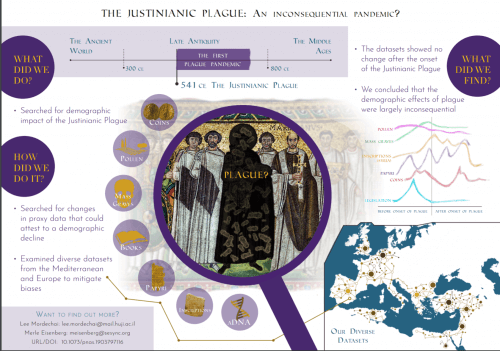A research team led by Dr. Lee Mordechai from the Hebrew University found that, contrary to popular opinion, Justinian's bubonic plague had no significant demographic effects.

In much of the current historical research and textbooks, Justinian's plague that occurred between 541-750 AD is described as having brought about dramatic changes in late antiquity. Researchers estimate that the epidemic resulted in the death of between 25% and 60% of the population of the Mediterranean region, or alternatively between 15 and 100 million people, a demographic disaster on a large scale. It is also claimed that the plague contributed to the fall of the Roman Empire, the end of antiquity, the rise of Islam and the beginning of the Middle Ages. A new study published in the prestigious journal of the National Academy of Sciences of the United States of America (PNAS), led by Dr. Lee Mordechai from the Department of History at the Hebrew University, reveals that contrary to popular opinion - the epidemic was not significant to the course of history. The unique study paints a different historical picture than we have known until today, and suggests for the first time that it was not the plague that led to the historical changes attributed to it.
As part of the growing preoccupation with environmental history, researchers have examined sources such as DNA, plant pollen, coins, inscriptions, papyri and graves, with the aim of understanding how the plague affected the region around the Mediterranean Sea. The researchers did not identify in these sources any signs that might indicate mass death on a wide scale, or substantial demographic changes that could be attributed to the plague. Researchers now argue that the plague was not as impactful as historians have tended to think.
The researchers focused on late antiquity (300-800 AD) which included significant events that were claimed to have taken place following the plague, such as the fall of the Roman Empire and the rise of Islam. The current research presents a different historical picture and in fact offers a new narrative for significant historical events.
"The study actually rewrites the history of Late Antiquity, a period of special significance for our region in the eastern Mediterranean basin. The current article is the third in a series of studies on the epidemic and additional studies are in the stages of editing and writing," says Dr. Lee Mordechai, who also teaches a seminar on the subject at the Hebrew University.
The interdisciplinary nature of the research, and the fact that it combined experts from different fields such as biology, archeology and palynology, allowed for a broader understanding of everything related to this epidemic and the impact it had on the region. "The article testifies to the opportunities inherent in interdisciplinary research," explains Dr. Mordechai, "the group work allowed us to use diverse sources to shed light on a specific historical event - the plague of Justinian's plague. Since most of the sources are independent and still point to the same conclusion, we could rule out the possibility that this is a coincidence, and strengthen our confidence in the research's conclusions."

One response
You did not write what the conclusions are! Just what not the conclusions!! disappointing.